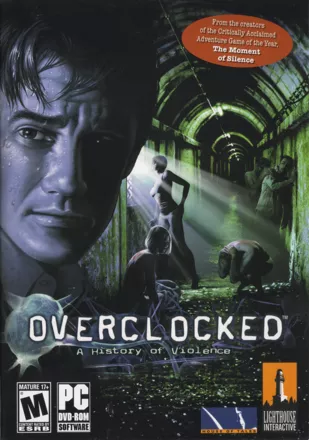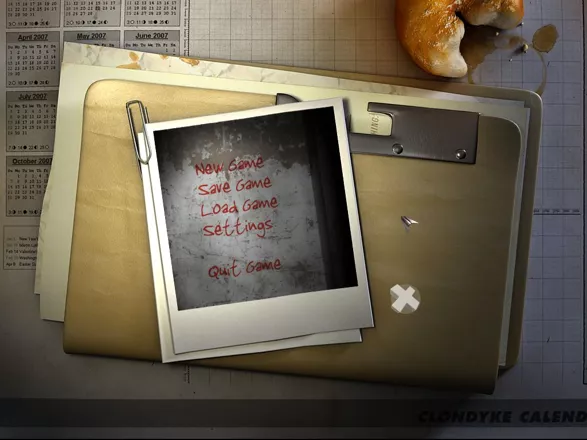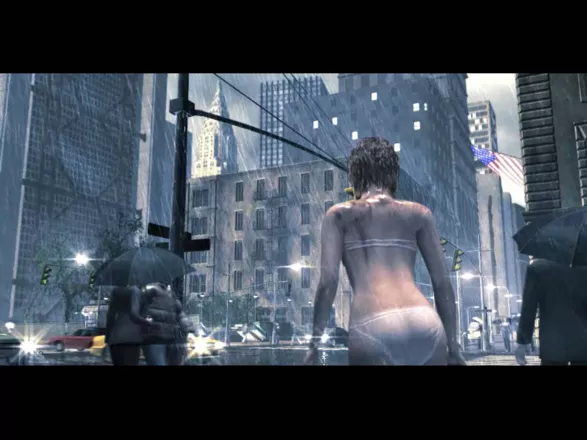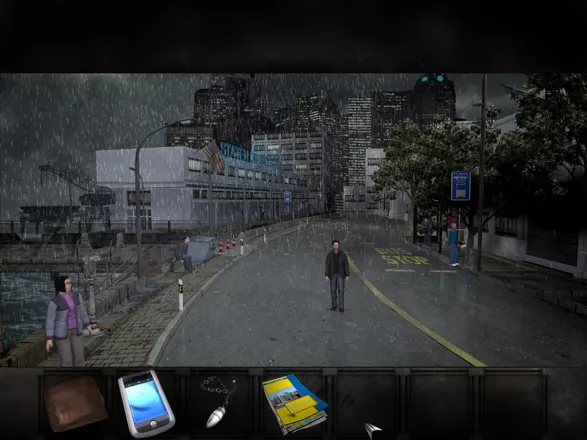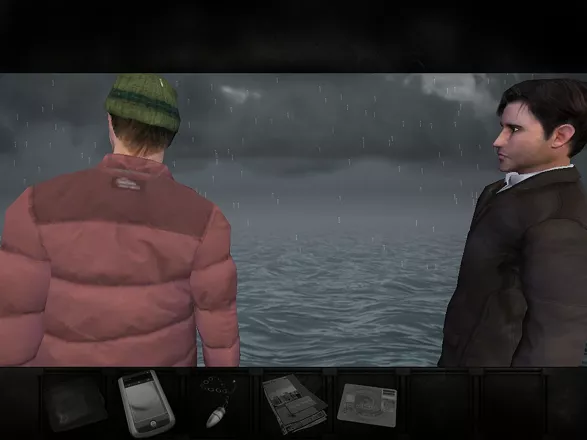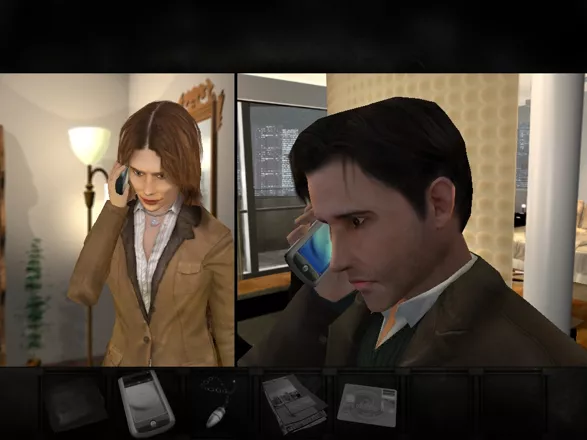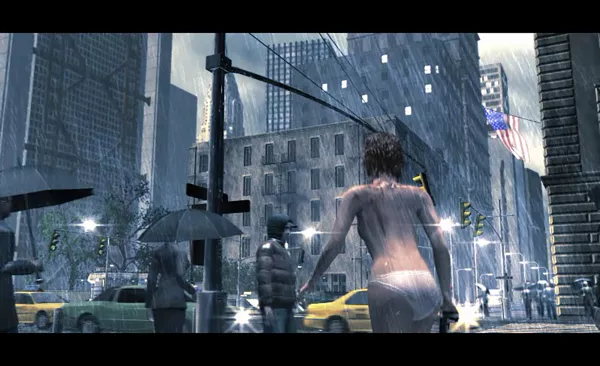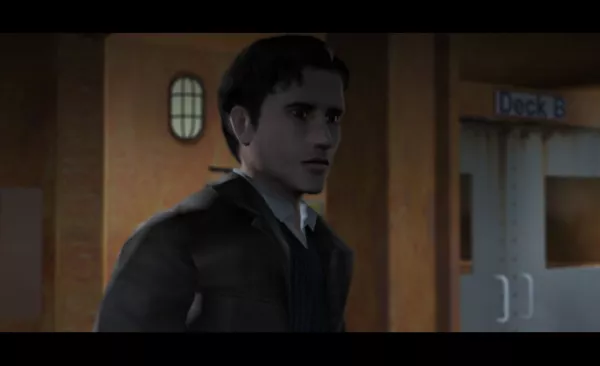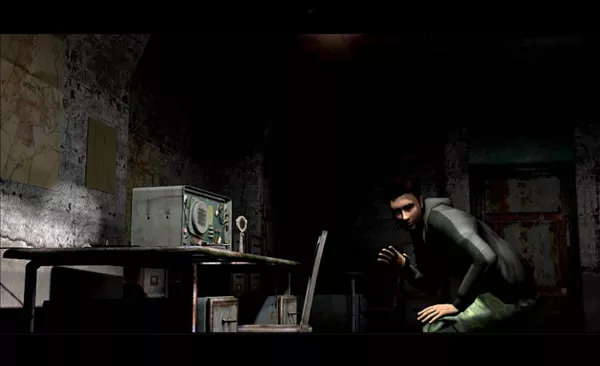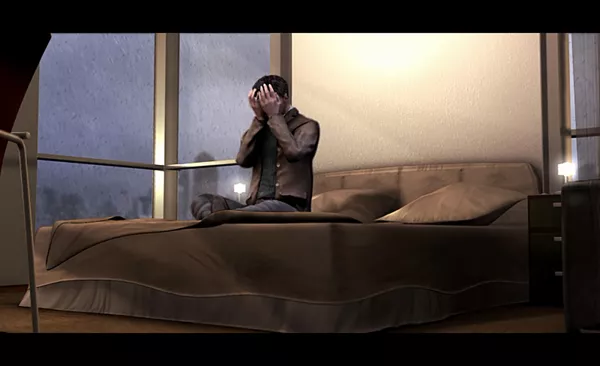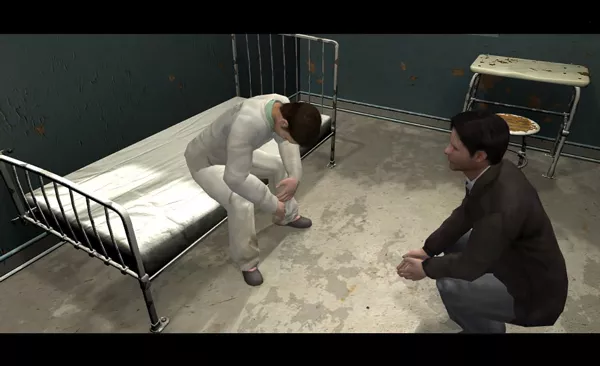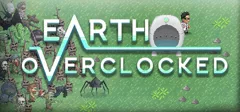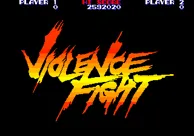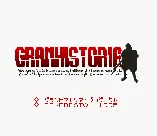Overclocked: A History of Violence
Description official descriptions
Overclocked is a psychological thriller presented as a point-and-click adventure game. There are 6 playable characters in total, each with their own adventure, and the events are told through a frame tale construction. The main protagonist is former US army combat psychiatrist David Mc Namara whose marriage is hanging by a thread. He also suffers from mysterious choleric attacks. He used to treat the Desert Storm troops, but left the army in 1999 due to a nervous breakdown.
As an expert in forensic psychiatry, he is called to the Staten Island Forensic Hospital in New York to examine five young men and women. They were found at different locations in New York, screaming, horrified, with complete memory loss and a total lack of orientation. Dave has to delve into their memories to reconstruct what has happened. This leads to six playable portions with different characters as Dave explores the events through flashbacks, using chronologically inverse storytelling. He has to trigger their memory by using objects and recordings from his sessions to advance the story. This is done through a PDA, also used to contact other people in the game and to receive messages and files.
The game features 3D character models and objects with pre-rendered backgrounds, and uses classic conversation and puzzle-solving gameplay, including an inventory to store and combine items. A dynamic camera is used for cinematic effect, with close-ups, panning, zoom and mosaic-style visualisation.
Spellings
- Overclocked. Оправданная жестокость - Russian spelling
Groups +
Screenshots
Promos
Credits (Windows version)
136 People (134 developers, 2 thanks) · View all
| Original Soundtrack | |
| Original Sound Design | |
| Audio Direction | |
| Development Director | |
| Creative Director | |
| Art Director | |
| Artists | |
| Additional Art | |
| Writing | |
| Engine and Tools Development | |
| Game Scripting | |
| Additional PDA Programming | |
| Scenery Art |
|
| [ full credits ] | |
Reviews
Critics
Average score: 76% (based on 46 ratings)
Players
Average score: 3.4 out of 5 (based on 31 ratings with 2 reviews)
Game design flaws keep Overclocked from reaching its potential
The Good
I'll tell you right up front that I didn't much like Overclocked. True, I'm not one who really enjoys horror, in movies or my games - and this is one of those games that borders on it, or at least reveals horrific events.
You play David McNamara, a psychiatrist, who has been called in to help 5 teenagers who wandered back into New York City screaming, half-naked and displaying other signs that they have just experienced a major trauma. They were sent to an old hospital on Staten Island where they were examined and medicated. Getting them to talk is David's first objective, and at first that seems like a very daunting task because they are completely "out of it." Eventually he will find a way to communicate with one of them. All conversations with them are recorded automatically in David's PDA. Playing back the correct recording to the right person at the right time is only real "puzzle" in the game. "Flashbacks" occur then which reveal pieces of their memories a little at a time until, eventually, it all becomes clear.
Besides the teens, there are other characters to interact with including David's estranged wife, the hotel clerk, some bar patrons, a police investigator, the strange doctor and nurse at the hospital. I enjoyed the familiar-sounding voice of the main character and thought all of the voice actors and actresses did a good job representing their characters.
The locations are few but just enough to get the story told. They include David's hotel room and the hotel lobby, a bar, the Staten Island Ferry area, the hospital and then an old barracks where the kids were housed. It is dark and raining during the whole game which increases the gloomy feeling of everything.
The interface was straight forward, the point and click actions were easy to accomplish, the inventory was minimal and there were no problems installing or playing the game.
The story is by far the best part of Overclocked. There is an interesting subplot involving David and his wife, an unusual "accident" that caused her harm, and David's unprovoked and sudden fits of rage. This added a personal touch and made me connect with the main character.
The kids' ordeal is revealed slowly and the shocking truth comes as quite a surprise when it is revealed in the end. Without giving too much away, I can tell you that the experience the teens have had and David's sudden bursts of aggression are connected. The ending stayed in my mind for several days after finishing the game.
The Bad
It takes an unusually long time for each one of the flashback cut-scenes to load. During the wait, you are faced with a black screen in a frame where the gameplay screen should be. It can take up to 3 full minutes for the scene to load. So, don't worry if that happens to you. There's nothing wrong with your game that everyone else hasn't experienced.
The graphics are not up to par with recent games. The motion is not full 3D, like advertised, and the movements of the characters aren't very lifelike. Neither are the graphics of the characters themselves. The purported wonderful facial expressions were just mediocre.
The music drowns out the voices at times and changes in intensity and volume, so it's impossible to find an agreeable setting. I had mine set to the lowest setting and it was still louder than it needed to be. There aren't very many sound effects to speak of. I remember the constant call of a crow together with howling wind in one segment that was repeated too often and made me frown.
The Bottom Line
Overall, Overclocked is a decent adventure game that might appeal to fans of the genre, especially those who like mysteries of this kind. The gloomy atmosphere coupled with the strangeness of the story could put this title into the horror category. Children should not play this game because of the violence, blood and anger depicted in it.
However, although the story is compelling and the acting good, the game as a whole didn't measure up to its potential, in my opinion. Game design flaws (long cutscene load times, blocky graphics of the characters and their movements, music volume fluctuations) held it back from being better.
Windows · by Jeanne (75814) · 2008
The Good
The German developers from House of Tales – the name implies it – place emphasis on storytelling, when they create their games. Always sticking to the adventure genre, they gained some popularity with "The Moment of Silence" in 2004 – a game, that didn't tap its full potential, but was nevertheless a quite enjoyable affair. "Overclocked" is their next big project, after they released some mini-adventures for mobile phones and helped converting the awful German telenovela "Verliebt in Berlin" into a video game.
The story of "Overclocked" is filled with violence and despair and doesn't sound uninteresting on paper. It takes place in the city of New York and casts you as a psychiatrist named David McNamara, who's an expert for post-traumatic amnesia. Your job is to reconstruct the lost memories of five young people, who seem to have shared a traumatic experience. When the police found them, the three men and two women were romping through the city, shooting with pistols, confused and unpredictable. As McNamara, you have to visit them in an old and run-down hospital on Staten Island to find out what happened. It's no safe job: some of them still behave aggressively and one patient even attacks David in the beginning.
There are two interesting aspects about "Overclocked". The first thing is, that you actually control six different characters – as soon as the patients remember certain events, you adopt the role of the respective person in an interactive flashback sequence. The second, perhaps even more outstanding aspect is the reverse storytelling, that starts with the most recent memories and goes on to the earliest. The concept is in some regards similar to Christopher Nolan's movie experiment "Memento", where Guy Pearce is unable to store new memories. The narrative structure of "Overclocked" is arguably even more complicated, since parts of the story are not only told in reverse chronological order, but also from different perspectives. Basically we have two lines of narration: the present one, where McNamara speaks with his patients, and the flashbacks, that slowly reveal past events by moving backwards in time and using five different viewpoints.
McNamara still remains the lead character of "Overclocked", not only because you control him more often than the others, but also because he's much more fleshed out than his patients. He's in fact a quite despaired person, who's constantly on the brink of collapse. I'm not spoiling anything, when I tell you, that his wife is going to leave him, as it already becomes clear in the very first scenes. And this is not the only problem, that troubles the poor psychiatrist. He's a quite ambivalent character with many good sides and many weaknesses. My impression is, the goal was to create a protagonist, who appears more human than other stereotypical video game heroes. The idea is good, but doesn't really work out, due to his often noncredible behaviour.
The 3D graphics aren't spectacular, but do a solid job in reflecting the game's dark atmosphere. Some well made cutscenes show important events and even the interactive parts create a cinematic feeling with their frequent cuts and panning. Music is rather sparse, but sound effects are put to good use and the voice actors do a more than solid job in the German version. The atmosphere is almost depressing: the game portrays an utterly cheerless New York, where rain keeps coming down in sheets. What we get, is arguably just McNamara's pessimistic view of the world – a character, who's ultimately tired of his own existence. The bitter taste of urban life reminded me a little of David Fincher's "Seven", but "Overclocked" is still far away from reaching the same level of intensity.
The Bad
The biggest flaw of "Overclocked" is quite simply its horrible gameplay. It is streamlined, unimaginative and boring. For the sad trend, that so many people seem to have lost their confidence in adventures, I tend to blame games like this one.
Most of the puzzles, McNamara has to solve, center on making his five young patients remember memories of their past. You usually run from one patient to another, talk to them and let them listen to audio recordings of what their colleague's said in earlier conversations. When a patient remembers something, you take over his/her role in one of the interactive flashbacks. During those scenes the five characters all stray around an abandoned military base – how they got there, is unclear. What they do there, is also unclear. What you have to do, is mostly just finding ways to open countless doors, air grilles and crates. Therefore you have to find keys, guess numerical codes and use the good old crowbar. The inflationary use of this worn-out stuff is sometimes really hard to believe.
I didn't have to think, while I played "Overclocked". I moved through it almost mechanical, as the gameplay becomes a matter of routine quite quickly – one standard task after another. It's a rare thing, that you're obliged to tackle a problem, that has nothing to do with opening things or jogging memories. As one of the patients, you have at one point to repair an old radio set to transmit a distress call. And as McNamara, you once have to darken a room and dazzle a patient with a flashlight, to make him recall a situation, he had in a dark corridor. I'm no expert, but I guess, a real traumatized man would rather wet his pants than share a suppressed memory, if his psychiatrist suddenly behaved like this...
The sad truth is, that the game is neither imaginative nor interesting, even when it breaks away from the routine, it establishes. And I haven't even talked about the oppressive linearity, that troubles the whole thing from start to finish. Progress can only be made, when you trigger the event, the designers had as next step in mind. What you have to do, must be done in a strict order. Further, the restrictive interface simply prohibits wrong actions. Hotspots become inactive, when they have no further use; characters refuse to go to places, that aren't relevant for the time being; you can neither move nor act freely. If you ever wanted to know, how your dog feels, when you put a very short leash on him, try "Overclocked". The game just drags you along without ever asking for your initiative, cutting down your activities, your movement and your thoughts. If this isn't a step into the wrong direction, I must be really disoriented.
However, even when you can live with the streamlined and unimaginative gameplay, I still wouldn't recommend "Overclocked". That the story puts your freedom in such a tight corset is even harder to forgive, when you take in account, that the story isn't even great. I have to nag about it as well.
"Overclocked" lacks a quality, that's vitally important for every game, that calls itself a thriller: it's called suspense. Almost nothing exciting or interesting happens during the slowly paced first half of the game. In the second half the story accelerates a little, but the whole mystery is far too obvious. You will likely anticipate the secret behind the traumatized patients long before McNamara does it, whose deductive skills appear rather slow. In fact, the protagonist's relation to his wife is the only somewhat interesting facet in a boring and predictable story.
The unorthodox narrative structure – the fact, that the story moves backwards in time – may sound interesting on paper, but doesn't benefit the game either. Behind the unusual structure hides an ordinary standard plot with lots of fundamental drawbacks. The credibility of the story is ruined by numerous plot holes and inconsistencies. The characterization of the patients is as superficial as their talk is silly. The writing, one of the strengths in "Moment of Silence", becomes unbelievably pathetic in "Overclocked". Some of the worst examples happen during McNamara's pub crawls, where he weeps on a poor barkeeper's shoulder about how miserable his life is – here it gets painful.
The Bottom Line
"Overclocked explores an archetypical, yet actual condition of mankind: violence", says the press release. Sounds quite intelligent and profound, eh? However, countless other video games deal with violence as well and the approach of "Overclocked" is hardly more philosophical. PR and product have at least something in common: they both try to sound sophisticated, but consist only of hot air.
There are enough people, who see "Overclocked" as a keen and interesting work, just because it dares to be a little different. But concepts are only as good as their execution. I don't think, the story is good, just because it tries to deal with some uncommon themes in some uncommon ways. There are numerous games with classic fantasy tales, that achieve their own goals more convincingly. It's obvious that House of Tales sacrificed the gameplay for storytelling ambitions, they couldn't realize. The result is streamlined adventure boredom at its worst; a disappointment, that fails in both disciplines.
Windows · by micnictic (387) · 2008
Discussion
| Subject | By | Date |
|---|---|---|
| The game is based on a book published in 1980's | Usman Amir (512) | Oct 17, 2017 |
| Real-time 3D? | Unicorn Lynx (181579) | May 17, 2008 |
Trivia
References
A poster for The Moment of Silence, an earlier House of Tales game, can be seen at the bus stop near the ferry port. In one of the later conversations in the game, the Grand Theft Auto series is also referenced.
Soundtrack
The Swedish metal band Soilwork wrote a song for the game's soundtrack.
Awards
- 4Players
- 2007 – #3 Best Adventure of the Year
- 2007 – Best Story of the Year
Analytics
Related Sites +
-
Gameboomers Walkthrough
This step-by-step walkthrough by nickie reveals all. -
Interview with Martin Ganteföhr - April 2008
Adventure Classic Gaming interviews Ganteföhr about his general game design philosophies and about the creation process of Overclocked: A History of Violence -
Lighthouse Interactive
Product page on the publisher's website -
Overclocked
Official game website -
UHS Walkthrough
Not your ordinary walkthrough, the Universal Hint System helps you solve the game without spoiling it for you. -
Zarf's Mini-Review
A mini-review of A History of Violence by Andrew Plotkin (September, 2008).
Identifiers +
Contribute
Are you familiar with this game? Help document and preserve this entry in video game history! If your contribution is approved, you will earn points and be credited as a contributor.
Contributors to this Entry
Game added by Sciere.
Additional contributors: Jeanne, Ascovel, Zeppin, Klaster_1, Jarek Bogalecki, marley0001, Patrick Bregger.
Game added November 9, 2007. Last modified January 10, 2025.


